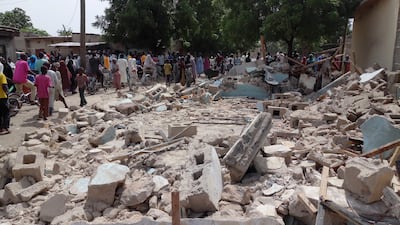Denied an education by the insurgency of militant group Boko Haram, tens of thousands of children across the Lake Chad region are instead tuning into lessons broadcast over the radio, the United Nations children's agency said on Tuesday.
The radio syllabus is providing lessons on literacy and numeracy, and staying safe amid the violence, to about 200,000 displaced and out-of-school children in the Far North region of Cameroon and Niger's southern Diffa region, according to Unicef.
"The level of boredom among children in camps for the displaced is tremendous," said Unicef spokesman Patrick Rose.
"With this radio education programme, children will receive lessons in a structured way, that keeps them in a rhythm … so that when they go back to school they won't be so far behind."
Boko Haram, whose name loosely means "western education is sinful", has killed more than 600 teachers and forced over 1,200 schools to close during its eight-year insurgency in Nigeria, Niger, Cameroon and Chad, according to the Unicef.
Three years ago, the abduction of more than 200 schoolgirls by the extremist group in Chibok, northeastern Nigeria, sparked global outrage and the celebrity-backed campaign #bringbackourgirls.
The radio education project - which is backed by the European Union and the governments of Cameroon and Niger - is engaging community leaders to share available radios and bring children together for the lessons.
About 150 lessons are being broadcast in both French and the local languages of Kanouri, Fulfulde and Hausa.
"In the very near future, we hope that children who learn by radio will also receive a certification and pass the school year," said Marie-Pierre Poirier, Unicef's regional director.
Beyond radio broadcasts, schoolteachers across the region have been trained by Unicef to identify and respond to security threats to protect children from Boko Haram, and to provide traumatised children with psychological support.
Boko Haram has killed more than 20,000 people and some 2.7 million people have been uprooted from their homes since 2009 as a result of the group's attempt to create its own state.
The militants have been driven out of most of the territory they held in early 2015, yet continue to carry out bombings and raids in north-east Nigeria, as well as in Cameroon and Niger.

